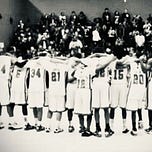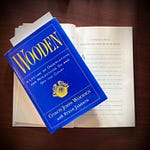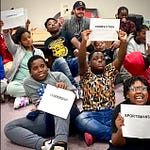For the athlete or coach who perseveres, and, even better, smiles proudly, in a scenario in which your intellectual capacity is silently doubted, this blog is for you. We athletes are a peculiar species, so it seems, to many, who never experienced the complexities of competition.
Be not uncomfortable with those who perceive us to be less intellectually inclined. Their attachment to that stereotype - more muscle bound than brain found - may serve as a safety mechanism when they encounter us. Judgment is a fast fix for inadequate emotional intelligence, and fear. Athletes, I encourage you to never question the capacity of your own mind because you love sport do dearly.
Kobe Bryant helped our cause immensely when he won the Oscar for his Animated Short Film, Dear Basketball, in 2018. He was breaking the mold for us - the athlete as artist, and sport, as art. I watched proudly from my couch as Kobe accepted his Oscar, as if he represented the misunderstood brilliance of so many athletes. It hit different for me because I played against Kobe in 1996. I ran back into him in at a conference in 2018 and we revisited, briefly, our high school battle. We lost by 5. Kobe scored 43. His post-basketball genius had just begun to reach the masses, and then we lost him. I’ll write more about that later. It still hurts, for so many complex reasons.
But this blog isn’t about Kobe. It’s about a Wendy Cope poem. I don’t know Wendy Cope. She’s a well known writer in the world of poetry. I imagine her to be pleasant, strong-willed, and witty. Though she could be none of the above. I certainly may be wrong about somebody I’ve only read about briefly online. But from her poetry, I believe her to be both provocative and empathetic, at least in the presentation of her clever words.
Wendy is a British poet with no shortage of praise for her work. Among her literary honors, she nearly became the British Poet Laureate in 2009, a prestigious distinction given to one poet as the national honorary representative. Joy Harjo is the current Poet Laureate in the United States. We’ll discuss Joy in the future, but please do look her up.
Cope’s poems mostly hover around the comedy, hope, and confusion of human relationships, however, she wrote a fascinating poem about sport. Well, more clearly, the poem is about befriending a person for whom she was unaware had a very successful athletic past. To Cope’s surprise, this revelation of her friend’s history as a star tennis player made her ponder her own judgement of the peculiar athlete species.
The poem is aptly titled Sporty People.
Sporty People
I took her for my kind of person
And it was something of a shock
When my new friend revealed
That, once upon a time,
She was a Junior County Tennis Champion.
How could that happen?
How could I accidentally
Make friends with a tennis champion?
How could a tennis champion
Make friends with me?
She wasn’t stupid. She read books.
She had never been mean to me
For being bad at games.
I decided to forgive
Her unfortunate past.
Sporty people can be OK –
Of course they can.
Later on, I met poets
Who played football. It’s still hard
To get my head round that.
Perhaps this expression was not for her to get her “head round that.” Or maybe it was. Maybe Cope wanted to express a cautionary message about judgment on behalf of the athlete species or anyone, really. Or, she simply could not understand how she could befriend this creature of strategic, competitive, physical movement. The beauty of poetry is we are allowed to interpret it as we choose. We’re even afforded future interpretation different from our original perception as wisdom seeps through over time. What a gift.
I am a Sporty Person. I stand with Sporty People. I laugh when we are still, on occasion, titled jocks. Really? Jocks? As in a jockstrap, a protective male undergarment. A quick google search of “jock stereotype” landed me at, of course, Wikipedia, in which the initial sentence read “…a jock is a stereotype of an athlete, or someone who is primarily interested in sports or sports culture, and does not take much interest in intellectual activity.”
I repeat that in my mind over and over, does not take much interest in intellectual activity…does not take much interest in intellectual activity.
I’ve been labeled a jock more than one time in my life. I admit, I did not wake up every morning dreaming about my english or science classes in high school. I did, however, maintain good grades so that adults would not take additional time away from baseball or basketball practices, which seems to me, a decent practice in critical thinking. Sport was my art; my intellectual activity. High academic marks were my shield to protect the art. In my junior year of college I began to embrace learning versus compliance in school. I learned to love the intellectual activity of the non-athletes. Perhaps I’ll meet a non-jock who will someday embrace the intellectual ability of the Sporty People.
I still have many who defer to sport euphemisms to speak, what they think, is my language. It goes a little something like this:
We have to put on a “full court press” and play a little “block and tackle” on this one so we can “intercept” and “regain possession” for the purpose of “keeping the ball in our court” before “making a halftime adjustment” and “pushing the ball across the goal line” in order to “hit this one out of the park.”
You mean:
We should adjust our strategy, rethink our mission, set a new bottom line, repurpose our funds, create value our competitors can’t provide, obtain collective buy-in, and push forward with an intense focus until we meet the goal.
Got it. I thought that’s what you said.
To all the Sporty People, let us not be offended. As former Roman Emperor and stoic philosopher, Marcus Aurelius, states in his book, Meditations, “Choose not to be harmed — and you won’t feel harmed. Don’t feel harmed — and you haven’t been.” Instead, let us be proud of our art and all that we gain from our intense focus on a practice that — based on the data — provides immense value and education to our lives.
In my book, Endless Teachable Moments - An Expression on the Art and Education of Sport, I wrote a poem called Nelson. You can read that later, but it is essentially a conversation between a perceived Sporty Person and an academic elitist who sees sport as nothing more than a budget-sucking, barbaric activity for non-academia. The Sporty Person exclaims to the standoffish elitist that sport is “a physical, competitive, critical thinking mechanism with applicable life values and social emotional impact involving a team or individual that partake in often rigorous, diverse, strategic movements, requiring mental, emotional, and physical, preparation, growth, and aptitude.” The academic elitist is a bit slow to embrace this definition, which is of course what happens when you don’t seek to understand from people you don’t have much in common with.
Sporty People, I stand with you. When they call us a jock, just smile, knowing what we know. And to Wendy Cope, thank you for your genius, and for, dare I say, “teeing this one up for me.”
Be great and break barriers,
Jason Aron Ronai
***Note: the picture is of the 2013 high school basketball team I coached in Chicago, some of the finest “Sporty People” I know.













Share this post